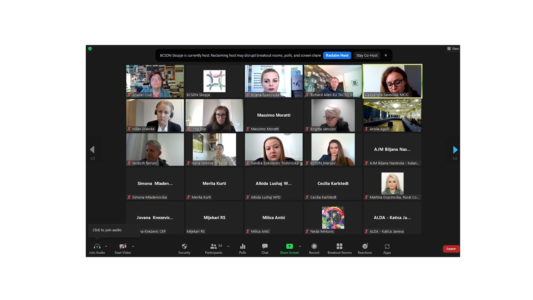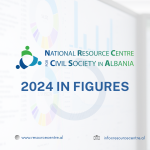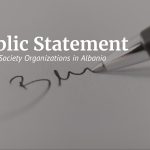From 3-7 October, CIVICUS’s group of national network organisations (AGNA), celebrated Global Accountability Week 2022. Participants worldwide through online activities learned and lead discussions on “unpacking” and diving deep into the concept of “dynamic accountability”, and exploring opportunities for building more robust civic space. On the last day of the GAW 2022, BCSDN organized a regional workshop on “Donors & CSOs: together towards a more Accountable Civil Society in the Western Balkans”.
The event was followed by more than 30 CSOs practitioners from the Balkans who, together with the donor representatives shared the success and the challenges of the CSOs accountability practices, the new power dynamics in CSO-donor relations, as well as the applicability of the national civil society codes in CSOs’ work. The event also reflected on the Global Standard for CSO accountability recognition on regional and global levels, manifested through its reference in the OECD DAC Recommendation on Enabling Civil Society in Development Co-operation and Humanitarian Assistance and the new DG NEAR Guidelines for EU Support to Civil Society in the Enlargement Region 2021-2027. The regional workshop was also part of a followed-up session of the NRC Partners Albania event on the findings of the OJF Self-Assessment on effective development cooperation based on Istanbul principles and CSOs’ challenges in their implementation, followed by more than 50 participants. The event was moderated by Ms. Biljana Spasovska, BCSDN’s Executive Director who pointed to the relevance of continuous donors- CSOs conversations in building more accountable civil society in the region and welcomed event’s main speakers and participants to jointly contribute to the topic.
Ms. Anabel Cruz, the Founder Director of the Communication and Development Institute (ICD) from Uruguay, discussed the Global Standard and the aspect of dynamic accountability, specifically the relationship between donors and grantees, and CSOs role in enforcing dialogue with the people they work with. Ms. Cruz further reflected that in the OECD DAC recommendation, the Global Standard is recognized as a well-implemented tool to promote accountability, shift the power, and promote dialogue and mutual accountability.
The event continued with focusing on the latest developments in civil society accountability in our region. Ms. Aleksandra Savevska, Project Officer at the Macedonian Center for International Cooperation (MCIC), provided an overview of the recent developments of the self-assessment mechanisms and the institutionalization of the Civil Society Code in North Macedonia. She particularly stressed that the Code is the way national CSOs understand accountability, analyze their strengths and weaknesses, and is the guiding behavior that CSOs intend to change. Similarly, discussing the history and participatory process of preparing and delivering the Code of Standards for Albanian CSOs, Ms. Ariola Agoli, National Resource Centre Manager at Partners Albania for Change and Development, covered specific issues regarding creating and delivering the Albanian Code of Standards. Concerning the question of EU Guidelines in the function of national civil society codes, Ms. Savevska and Ms. Agoli recognized that the in the Guidelines, the EU addresses the issue of the internal work of the CSOs and their compliance with specific standards of accountability and transparency. They also pointed out that MCIC and PA, as national organizations leading the creation and institutionalization of the Codes, are going in the right direction aligning the Codes with various initiatives worldwide.
The event’s final session invited prominent CSOs donors from the region to discuss their role in creating a more accountable and effective Western Balkans civil society. Ms. Hillen Francke, the Head of Sector at Civil society and human capital development, at EU DG NEAR, recognized the pivotal civil society role in participatory democracy and, more widely, in the effective development in the Balkans. She addressed the recent success and challenges of how the EU supports CSOs in the Western Balkans and how the EU CS Guidelines could promote and strengthen the civil society capacity in our region. In addition, Ms. Birgitta Jansson, Senior Programme Manager/ Specialist Democracy and Human Rights Department for Europe and Latinamerica at Sida, by discussing on latest Sida’s strategy and support to civil society in empowering rights holders and holding duty bearers accountable, pointed to the Sida role in promoting the civic space and civil society accountability in the Western Balkans. She recognized the GS recognition in the new EU Guidelines and the OECD DAC Recommendation. Mr. Richard Allen, the EU TACSO 3 Team leader, pointed to the overall EU TACSO support of the Western Balkans civic space and civil society accountability efforts. With regard to the EU Guidelines and EU TACSO’s role in the process, Ms. Allen specified that EU TACSO 3 efforts to measure the extent to which civil society will operate in a more enabling environment, the level of dialogue between CSOs and governments in producing better policy, and the advancement of CSOs’ capacities. He also stressed the interconnectivity of all documents mentioned above: the national civil society codes, the OECD DAC Recommendation, and the EU Guidelines, and the way of their speaking in one voice but in different directions.
The event concluded with participants’ discussion and once again highlighted the role of the national civil society codes as an enabling mechanism that promote participatory democracy, which also help the EU Guidelines to encourage CSOs in the region to invest in their internal accountability practices and enhance their capacities.






